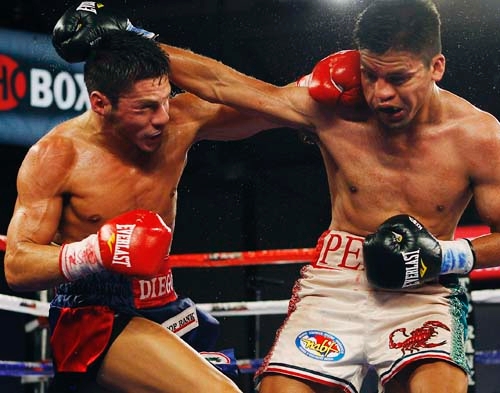Study shows boxers can avert brain disease


Common sense would suggest the more a person gets hit in the head, the more likely that person could suffer from a brain disease later in life.
A yearlong study of 78 boxers and mixed martial arts fighters by the Cleveland Clinic Lou Ruvo Center for Brain Health supports that assertion. But the results of the "Professional Fighters Brain Health Study," which were released late Wednesday, also showed that young fighters don’t necessarily have to be in danger of suffering from Parkinson’s disease or Alzheimer’s long after they’re done competing in the ring.
With constant monitoring and early detection of any changes within the brain, preventative measures can be taken to reduce the risk of brain disease.
"Our study shows there appears to be a threshold at which continued repetitive blows to the brain begin to cause measurable changes in memory and thinking despite brain volume changes that can be found earlier," said Dr. Charley Bernick, a Las Vegas neurologist who led the study at the Ruvo Center. "Nothing was actually surprising, which is good.
"What we found was basically what we thought as it pertains to Parkinson’s and Alzheimer’s. What’s important is we can start detecting cognitive changes occurring before these symptoms show up."
Fighters who participated in the study, averaging 29 years old, were put through a battery of tests, including a magnetic resonance imaging brain scan, with computerized tests that measured memory and thinking skills.
The study was broken into three areas: fighters with 12 or more years of experience, fighters with six to 12 years’ experience and fighters with six or fewer years in the ring. According to Bernick, fighters with less than six years’ experience showed no reduction of volume in the brain, while fighters with six to 12 years’ experience showed signs of a decline in brain volume, and fighters with 12 years or more experience showed a reduction in brain volume.
"The results showed that there was a relationship between a greater number of fights and lower brain volumes, which showed certain cognitive measures such as reaction time and speed of processing were declining with an increase in the number of fights," Bernick said. "There isn’t a specific number of fights per year that affect cognitive performance. Instead, the study showed a relationship between the number of years fighting and the number of fights per year.
"Fighters who have been fighting for 12 years or more show cognitive delays, and then when you factor in fights per year, the worse cognitive function gets.
"There seems to be a window of time where these fighters should be tested more frequently and where early damage can be identified. And they definitely need to be tested sooner than later."
Las Vegas super bantamweight Jesse Magdaleno, who is undefeated in eight fights, took part in the first study. Magdaleno said he is a believer in Bernick’s work.
"My health means a lot to me," Magdaleno, 20, said. "Doing this study really gets me involved with my body, and you don’t want to deal with any injuries."
Bernick said the data could be applied to other contact sports, such as football, hockey and soccer, in which an athlete could have a reduction of cognitive skills over time the longer that athlete participated in that sport.
"No one really knows what type of athlete is at greatest risk," Bernick said. "Athletes in football, boxing, hockey and MMA have all been documented as having CTE (chronic traumatic encephalopathy)."
Bernick said the ongoing study, which currently has 109 participants, will grow to include retired boxers and those who never have been exposed to contact sports. Among the retired boxers who have agreed to participate include former world heavyweight champions Ken Norton and Leon Spinks. The goal is to have 600 participants.
"We want to add the two new groups to help draw contrasts to what we already know," Bernick said. "The retired fighters group will help us learn how much of a contrast there is to current fighters. The group that has not participated in a noncontact sport will also offer us an important contrast in terms of brain trauma."
Bernick said the key to the study will be maintaining current data with the participating fighters.
"We now have a baseline to work from," he said. "But moving forward, it’s important we continue to monitor these fighters and track their progress. If things show up, we can diagnose any symptoms early enough to ensure their safety.
"It’s also helpful for the regulatory commissions in terms of supplying them with accurate information in terms of licensing."
In Nevada, all fighters age 36 and older must submit to a comprehensive medical exam, including a brain scan depending on a fighter’s history, before being licensed to fight. Nevada Athletic Commission executive director Keith Kizer said the commission closely is monitoring the study at the Ruvo Center and, depending on its future findings, could make adjustments to its regulations.
Bernick said the more data that are gathered on the subject, the safer the sports will be. His study will be presented during the American Academy of Neurology’s weeklong annual meeting, which starts Saturday in New Orleans.
"The results fit what we expect as it pertains to chronic brain diseases," he said. "Now, we need to continue to monitor these fighters and see what else we can learn."
Said Magdaleno: "I’m staying with it. It’s great what they’re doing."
Contact reporter Steve Carp at scarp@ reviewjournal.com or 702-387-2913. Follow him on Twitter: @stevecarprj.












